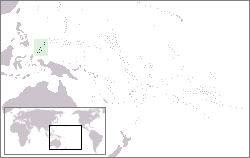Palau
Palau (Belau) is a group of more than 500 islands, covering 458km², in the Micronesia area of Oceania, to the southeast of the Philippines.
Understand
After three decades as part of the UN Trust Territory of the Pacific under US administration, this westernmost cluster of the Caroline Islands chose independence in 1978, instead of joining the Federated States of Micronesia. A Compact of Free Association with the US was approved in 1986, but not ratified until 1993. Palau became independent on October 1, 1994.
History
Early Palauans may have come from Polynesia and Asia. Depending on the origin of a family, Palauans may represent many parts of Melanesia, Micronesia and Polynesia. However, they are not traditionally considered to be Micronesian. For thousands of years, Palauans have had a well established matrilineal society, believed to have descended from Javanese precedents.
Palau had limited relations before the 18th century, mainly with Yap and Java. Had it not been for shipwrecked islanders who took refuge in the Philippines, Europeans likely would not have found Palau until much later. Englishman Captain Henry Wilson was shipwrecked off the island of Ulong in 1783 and it was Wilson who gave the archipelago the name "Pelew Islands".
In the late 19th century, possession of the islands was claimed by Britain, Spain, and Germany. In 1885, the matter was brought to Pope Leo XIII for a decision. The Pope recognized the Spanish claim, but granted economic concessions to Britain and Germany. Palau then became part of the Spanish East Indies, along with the Northern Mariana Islands, the Caroline Islands and the Marshall Islands. They were all administered from the Philippines. Spain sold the Palau archipelago to Germany in 1899 after which it was administered from German New Guinea, and a period of economic development began. German engineers began exploiting the islands' deposits of bauxite and phosphate, and a rich harvest in copra was made. World War I intervened and the German period lasted only 15 years after which the League of Nations awarded Palau to Japan. The Japanese presence made Palau a major target for the Allied forces in World War II, and there were several major battles in the area.
Climate
Palau enjoys a tropical climate all year round with an annual mean temperature of 82 °F (28 °C). Rainfall can occur throughout the year, averaging a total of 150 inches (3,800 mm). The average humidity over the course of the year is 82%, and although rain falls more frequently between July and October, there is still much sunshine. Typhoons are rare, as Palau is outside the main typhoon zone.
Talk
English and Palauan are the official languages, although some islands also give official status to their own languages. The state of Angaur is actually the only place in the world where Japanese is an official language, as Japan has no official language.
Regions
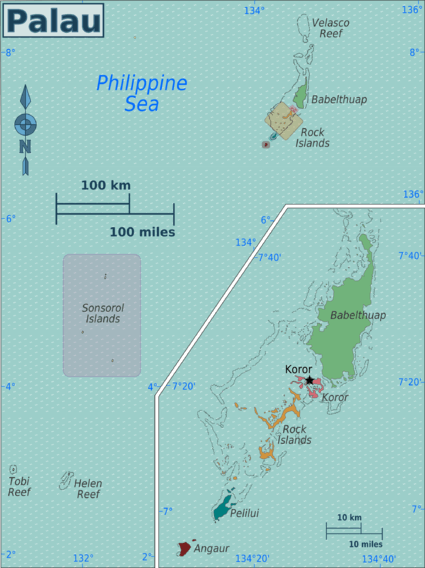
| Babeldaob (Melekeok) the largest island, with a population of roughly 6,000 people, also Babelthuap, Babelthwap, Babeldoub, Babeldaub, etc. |
| Koror home of the largest city of the same name. |
| Rock Islands made up of almost 300 mostly uninhabited islands, home to Jellyfish Lake, a lake with millions of jellyfish with very weak stingers where snorkelers can safely swim. |
| Peleliu about 700 people live here, mostly in the village of Kloulklubed. |
| Angaur remote southern outpost with about 200 inhabitants, site of a major WWII naval battle and a modern day surfing destination of some repute. |
| Sonsorol Islands consists of Sonsorol and Hatohobei states, these islands are home to about 100 people way to the southwest of the rest of Palau. |
Cities
- 🌍 Melekeok - new capital (pop. 381) This is on the island of Babeldaob and is a pleasant drive from Koror along the new road constructed by Daewoo. Head out over the bridge and the road to Melekeok is clearly signposted.
- 🌍 Koror - the largest city and former capital. Koror contains Palau's only real concentration of shops, restaurants, and hotels. Many of the largest dive operators are also based here.
Other destinations
The southwestern islands of Palau are worth a visit if you have your own marine transport such as an ocean-going yacht. There are Sonsorol, Fana, Meriil, Hatohobei and Helen Reef, a conservation area. However be sure to take mosquito repellent if you visit Meriil as its local name is dancing island. Go there and you will find out why! If you intend to visit any of these islands it is a wise idea to make the acquaintance of the governors at their offices in Koror. If you are lucky you just might be able to take a trip on the island supply vessel, the Atoll Way. Sleeping is on a hard wooden platform along with the other souls who are either returning to their home islands or maybe the doctor from Peleliu Island Hospital who is making a routine visit to check up on the health of the islanders.
Get in
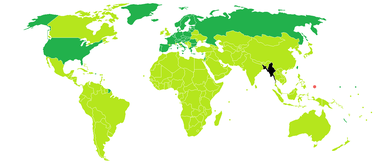
Visa requirements
Visas are not required by citizens of any Schengen country (90 days), the United States (a year), Israel (90 days), the Marshall Islands (a year) and the Federated States of Micronesia (a year). Nearly all other visitors can obtain a 30 day visa on arrival, except for citizens of Bangladesh and Myanmar who must obtain a visa in advance.
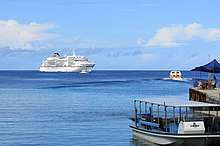
By plane
The only realistic choice. There is only one airport, Airai (ROR), on Babeldaob. Scheduled service is available to Seoul, Taipei, Macau, Manila, and Guam. Charters are also available to Tokyo, Hong Kong, Yap, and other destinations.
By boat
Possible but not very easy. Cruise ships occasionally visit Palau.
Get around
Taxi and rented car. Lots of local taxis. If you rent a car, be prepared to drive slowly on some bumpy roads. Both left and right hand drive cars are present in Palau, which can cause some confusion. If you drive south, to Ice Box Park, the facility behind it is a sewage treatment plant. Any other diving will be from a boat, after an hour or more ride and cost around US$150 for a two tank dive. There are no dive spots or beaches on the main island — Koror. The road north is paved and is very nice... once you get past the airport.
See
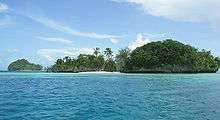
Palau has all of the gorgeous tropical tranquillity you could wish for in a Pacific island state. Most visitor attractions are found on and around The Rock Islands or Chelbachebover. These 250 rock islands — many tiny, uninhabited places — offer some enchanting views and are a World Heritage site. They are a silent invitation to kick back and enjoy a touch of paradise. Have a cocktail in one of the beach clubs on the country's perfect white sand beaches, admire the beautiful deserted bays and lagoons from a kayak or do as most visitors do: dive under to see the stunning and untouched marine life right under the surface. Popular dives include Blue Corner, Blue hole and the German Channel.
Head to Jellyfish Lake for the extraordinary experience of snorkeling between the countless and unique stingless jellyfish. The isolated location and lack of predators have led the jellyfish to develop this significant difference from the ones in the nearby lagoon. Take a guided tour along ancient stone monoliths and terraces while your guide tells you all about the legends that surround them. With just over 21.000 inhabitants, even the capital might feel like a village, but there's a handful of interesting sights and a few museums showcasing traditional Palau culture and the country's turbulent war time history. Again though, it's the sheer beauty both above and under water that makes visitors rave about this small island nation.
- Palau International Coral Reef Center, ☎ +680-488-6950, e-mail: picrc@picrc.org. Very educational aquarium with a good souvenir shop. Emphasis of displays is on education. They include a topographical map of Palau; a recreation of a mangrove swamp, a seagrass aquarium; an inner reef aquarium; an exhibition of coral and another of the country's famed jellyfish; deep-water aquariums and a couple of salt-water crocodiles to end the tour. Easy walk from downtown Koror in the direction of Malakal
Do
.jpg)
Palau is most famous for scuba diving. One of the most famous dive sites, Blue Corner, with constant sharks and a high current — is located less than 1 hour's boat ride from most resorts. There are many local dive shops and live-aboards that offer tours in Palau. There are also tours to World War II battle fields on Palau.
The Blue Corner, German Channel, Ulong Channel and Blue Holes are all amazing dive sites. You can dive the same site again and again and have completely different experiences each time.
Palau is also famous for its jellyfish lakes. These lakes contain jellyfish which have evolved away their stingers in the absence of predators. There are many tours which will go to the jellyfish lake to snorkel. SCUBA diving is not permitted, nor is necessary, in the jellyfish lake. Palau Jellyfish Lake is included in the category of natural phenomena and scientific mysteries.
Dive shops
- NECO Marine Palau, www.necomarine.com (Located at the NECO Malakal Marina), ☎ +(680) 488-2009 or 488-1755. 7:30a-5:30p.
- Neco Marine is a locally owned and operated tour operator that was also PADIs first dive center on Palau. NECO Marine Palau provides custom tours and boat charters, specializing in scuba diving, special discounted Palau resort packages, snorkelling, and fishing. Whether looking to book an activity for a large group or a customized private tour with a private guide, Neco Marine Palau can accommodate almost any request. Divers are also able to enjoy up to 32% EAN Nitrox complimentary on all dives. $.
- Palau Dive Adventures
- Concierge service dive shop that is well recommended. It is limited to three people per diver, and offer a Monday to Friday schedule where the person dives 14 times in 5 days. Also offers a liveboard option. Expensive.
- Splash,
- the dive shop attached to the Palau Pacific Resort is recommended. The equipment available for rental is of high quality, and either new or well maintained. The dive masters are also very experienced, responsible and know the dive sites very well. Angelo at Splash is highly recommended as a dive master especially if you have not dived in stronger currents. Splash runs a large, wide diveboat, carrying more than 20 divers.
- Fish 'n Fins
- is the oldest dive center in Palau. They have two live-aboard vessels, and seven smaller (and faster!) dive boats, operating from the base in Koror. The guides are very professional and are more than willing to share their extensive knowledge of the ocean and the life in it. Divers can use Nitrox EAN 32 for the same price as air. Gas mixtures for technical divers are also available.
- Sam's Tours
- is another dive shop in Palau that offers diving, snorkeling, kayaking, fishing and land tours. They have some great guides that provide educational and environmental information about the locales. Sam's Tours uses small, fast narrow boats which carry 4~8 divers.
- Sara Guide Service, ☎ +680 488 6856. Environmentally responsible professional sports fishing guides in Koror. They have experienced Palaun boat captains and Japanese and Western guides that make you feel welcome. Catch and release fish and have a great time! Great food too on their 8 and 10m boats.
Liveaboards
- Expedition Fleet, is the largest privately owned live-aboard fleet in the Philippines. Their ships operate all over the Philippine Island and Palau. Expedition Fleet is known for experienced and professional Dive Masters, and for excellent service on board.
Buy
Money
|
Exchange rates for U.S. dollars As of 25 January 2019:
Exchange rates fluctuate. Current rates for these and other currencies are available from XE.com |
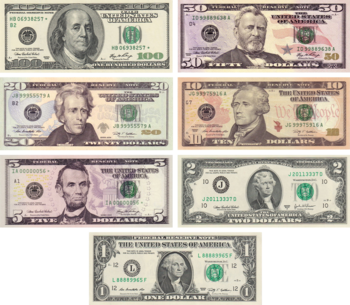
Palau uses the U.S. dollar as its currency ("$", ISO currency code: USD). It is divided into 100 cents.
- W.C.T.C. Shopping Center, Koror (Located at the heart of Koror), ☎ +680 488-1633. 7AM to 10PM. This is the shopping destination in town. It has a full-size grocery store, a drug-store, digital photo printing, The Athlete's Foot, and a full-service department store with a broad selection of local souvenirs.
Costs
As you might expect from a remote island where tourism is the main industry, prices are comparatively high, and even a low-end daily budget would be around US$100/day. An increase in visitor numbers in 2015-16 (including many Chinese package tours) has caused overcrowding; in 2017, President Tommy Remengesau proposed policy intended to reposition Palau as a destination of primarily "five-star hotels" (so fewer visitors, at a higher cost) to limit the negative environmental and social impact.
Handicrafts
Palauan storyboards are traditional wood carvings depicting Palauan myths and legends.
Eat
- Almost everything. Palau has large communities from Taiwan, the Philippines, Korea, Japan and the USA and the local stores have evolved to supply their needs. So Koror offers an amazing range of foodstuffs in its stores, at a price of course. Japanese-inspired Bento lunch boxes are very popular.
- Drop Off Bar and Grill (488-7505) a Popular hangout located near the Palau Royal and Cove Resorts, Drop Off is a outdoor restaurant that is frequented by tourists and locals alike. Most ideal for a relaxing casual afternoon by the swimming pool, or for a night of conversation and drinks. The bar specializes in fresh locally caught fish served in a various tasty varieties. Dont miss their famous Poke or spicy Poke Bowls. Palau's local beer is readily available on draft. The menu also offers large burgers, sandwiches, steak, pizza and fish and chips. Vegetarian options are also available. Reservations are recommended for dinner. $
- The Rock Island Cafe in Koror is a great place for a quick bit of American-style food. It is located a little west of the Court House on Koror Island.
- Kramer's - on the wharf at Malakal. A bit hard to find for the first time but food is good and the nightlife always interesting.
- Bem Ermii is in a small trailer near the courthouse in downtown Koror, and makes great burgers and milkshakes.
- Carp is a good medium-range option with generous portions and well prepared dishes of Japanese and local flavor, including coconut crab. It's located adjascent to the Palau Royal hotel next to the dock that takes you to the Carp Island resort.
Also, the Taj, an excellent Indian restaurant, Fuji, a reasonably-priced pseudo-Japanese restaurant, or Dragon Tai on the way into Koror.
Drink
Red Rooster Beer. Despite its size Palau has a small brewery, to be found next to the West Plaza by the Sea hotel (see below). It offers Amber and Stout and three other beers. Abai Ice in Koror is a small hut that offers fresh fruit smoothies — highly recommended.
- Drop Off Bar and Grill (488-7505) a Popular hangout located near the Palau Royal and Cove Resorts, Drop Off is a outdoor bar that is frequented by tourists and locals alike. Drop Off is popular with local sports fans and is a great place to catch the latest game or enjoy a cold draft beer after a day of diving. After dinner hours the bars a great place to enjoy a lively conversation with a variety of locals or relax with friends $
Many licensed establishments in Palau — from quiet little bars to "Japanese"-style karaoke bars complete with bar girls. For a decent affordable drink, try Sam's Dive Shop or High Tide. Alcohol is readily available at most stores. Public drinking is not allowed, and the local police are more than happy to inconvenience you if you are caught.
- Q-ball club (Koror), ☎ +680 4881832. You can play pool and chill out.
- Palm Bay Bistro, Malakal (right behind West Plaza Malakal, south Koror, right before the Ice Box Plant), ☎ +680 488-3476. 7AM-9PM. Great steaks and pastas, and it has the best bartender in Koror with a jewel of a collection of signature drinks and coffees. Also serves Red Rooster Draft on tap and is located right next door to the Palau Brewing Company, Palau's own microbrewery. Brewery tours also available upon request.
Sleep
Budget
Palau offers a number of guest house style boutique accommodations. Some are close to or within Koror, some are not. These are available for international bookings via dive shops that offer holiday packages (such as Sam's Tours). Prices range from US$50 a night upward.
- Guest Lodge Motel (Free transfer from airport. Short walk from), ☎ +680 488-6320, fax: +680 488-5616, e-mail: shmull@palaunet.com. The Guest Lodge Motel offers a nice and clean place to stay if you just need a place to sleep and relax between days of outdoor activities. The Tuilding looks a bit shoddy from the outside, because the top floor is not finished. Rooms have AC, refrigerator, Cable TV, 130 V and 230 V power outlets, shower/bath, towels, etc.
Mid-range
There are also a number of nice basic hotels available in Palau.
- Airai Water Paradise Hotel & Spa, ☎ +680-587-3530. The hotel has three of the largest things of Palau—the largest storyboard full of Palau history, the largest water park with two water slides, and the largest olympic-sized swimming pool. Standard rooms, honeymoon suites, and newly-renovated ocean view suites are available.
- West Plaza by the Sea, ☎ +680-488-2133. 36 rooms overlooking the ocean lagoon and nearby islands. Rooms range from standard class to deluxe rooms with kitchenettes, and a penthouse suite on the roof deck with a large private veranda, whirpool bath, kitchenette, and plenty of spacious living area. West Plaza By the Sea also features the Red Rooster Cafe. The cafe offers a wide selection of Japanese Cruisine, open for breakfast, lunch and dinner. The nightly happy hour features Palau's only locally brewed beer on tap, Red Rooster Draft.
- West Plaza Desekel, ☎ +680-488-2133. Located near museums, restaurants and banks. West Plaza Desekel offers 30 rooms ranging from deluxe to standard accommodations. Located on the hotel's ground floor is the Deskel Market, a full service grocery store complete with ice cold beverages, fresh local and imported produce and a large assortment of Western and Asian foods.
- The Caroline's Resort, ☎ +680-488-3754. A few minutes outside of downtown Koror, this charming option offers accommodation in several bungalows nestled in the hills amongst the jungle. The bungalows are equipped with A/C, satellite TV, attached bathrooms and bar fridges. Each also has an external patio with views over the ocean. Nice touches include the option to have breakfast served on your patio, and guests also have access to the Palau Pacific Resort's amenities so you can enjoy the beach and pool during the day.
Splurge
There are lots of reasonably high end resorts on Palau, most catering for scuba divers.
- Palau Pacific Resort. Is a world class resort on the outskirts of Koror. Known locally as PPR, it is very nice (beautiful beach, excellent restaurant, vaulted ceilings) but it is also quite a ways out of Koror (10-15 minute drive). They run an hourly shuttle into Koror most evenings, or it will set you back about $5 each way for a cab.
- Palau Royal Resort. One of the newest hotels in Palau - catering largely to Japanese. Located in Malakal, a couple minutes walk away from Sam's Dive Shop or Neco Marine.
Learn
Palau Community College ( offers AS/AA degrees and occupational certificates. The campus library is open to the public, and offers computer terminals for community members and visitors to check email. The school is accredited through the Western Association of Colleges.
Stay safe
Palau is quite a safe country to visit. Walking in downtown Koror at night, even past midnight is quite safe. But as with any place in the world today, common sense prevails. Pedestrians should be careful, as sidewalks are limited even in downtown Koror.
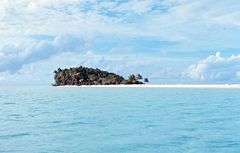
Saltwater Crocodiles (Crocodylus porosus) still exist in Palau's mangroves and in the beautiful Rock Islands and can potentially be found anywhere on the island. Despite their fearsome and, in some areas, very justified reputation, here they rarely grow to the immense size that they do in Australia and New Guinea. There was only one fatal attack by a crocodile in Palau within recorded history and that occurred in 1965. The biggest crocodile in Palau's history was 15 feet in length- large, but this is an average size for saltwater crocodiles in most other countries. The rarity of attacks probably stems from the fact that there are no more than 150 adult individuals on the island. Snorkeling and scuba diving are very popular in Palau and there has never in recent history been a report of an attack on a tourist. Judging from a recent survey, it appears crocodiles are quite unjustly hated by the locals, in harsh contrast to the worship they are given by the indigenous peoples of Australia, New Guinea and the Solomon Islands. The reasons for this are unclear.
Bull Sharks are common in the coastal waters and estuaries, so caution must always be taken while scuba diving or snorkeling.
Stay healthy
Tap water is not safe to drink.
Respect
Palauans have been known throughout history for their hospitality. Many Palauans are very understanding, realize cultural differences, and easily give respect for foreign visitors. Be sure, however, to always pay respect to the local culture. As with any other ethnic group, rude remarks or any form of prejudice against the local culture is not taken kindly. Palauans can be just as angry and rude as they are kind. As long as you do not disrespect the culture, violate historic areas, pollute, or harm the ocean in any way, you will find the local atmosphere very laid back and easy going. Palau is a matrilineal society with very strict roles for men and women. Western ideas such as feminism are not standard to the Palauan population, and an overly zealous attempt at instilling such ideas is taken as annoying, ignorant, and obnoxious. Most Palauans, however, gladly engage in such debates and find intellectual conversations interesting. Locals do not expect foreigners to understand the national identity and local culture, so a quick apology for any wrongdoing is more than enough to satisfy a little friction.
Connect
Go next
There is a $100 Embarkation Tax (new rate as of 1. Apr. 2017) levied on most passengers departing by air. The tax is paid just before you go through immigration and is cash-only. There is an ATM in the airport lobby.
